Science Mapping the Knowledge Base on Sustainable Human Resource Management, 1982–2019
Abstract
1. Introduction
- RQ1:
- What is the volume, growth trajectory, and regional distribution of scholarship on S-HRM?
- RQ2:
- Which journals, authors, and documents on S-HRM had the biggest citation impact?
- RQ3:
- What is the intellectual structure of the S-HRM literature?
- RQ4:
- Which topics in the S-HRM knowledge base have received the most attention from scholars, and what is the ‘research front’ in this field of sustainability research?
2. Conceptual Background of the Review
- “Capacity of organizations to create value in their organizations thereby having the ability and capacity to regenerate value and renew wealth through the application human resource policies and practices. This will entail investment in human knowledge through continuous learning, and the application and development of such knowledge through employee participation and involvement” [10] (p. 60)
- “Sustainable HR strategy can be defined as the management of human resources to meet the optimal needs of the company and community of the present without compromising the ability to meet the needs of the future.” [11] (p. 910)
- “Sustainable HRM is the utilization of HR tools to help embed a sustainability strategy in the organization and the creation of an HRM system that contributes to the sustainable performance of the firm. Sustainable HRM creates the skills, motivation, values and trust to achieve a triple bottom line and at the same time ensures the long-term health and sustainability of both the organization’s internal and external stakeholders, with policies that reflect equity, development and well-being and help support environmentally friendly practices.” [12] (p. 3)
- “The basic concept underlying the sustainable HRM discussion is that firms seek different kinds of outcomes to satisfy their stakeholders’ expectations. These outcomes may be economic, social, human, and ecological, and firms often seek them simultaneously although any one of the outcomes may be more important to an organization than others.” [13] (p. 4).
3. Method
3.1. Search Criteria and Selection of Sources
- Our first search focused on the keywords (TITLE-ABS-KEY (“sustainable”) OR TITLE-ABS-KEY (“sustainability”) AND TITLE-ABS-KEY (“HR”) OR TITLE-ABS-KEY (“Human Resource”)). This search produced 4475 documents. We assessed all document abstracts for eligibility and selected 351 documents. We then conducted additional searches and assessed all document abstracts for eligibility.
- The search on (TITLE-ABS-KEY (“HR”) OR TITLE-ABS-KEY (“Human Resource”) AND TITLE-ABS-KEY (“triple bottom line”) yielded 31 documents, from which we selected 13 as eligible.
- The search TITLE-ABS-KEY (“CSR”) AND TITLE-ABS-KEY (“HR”) OR TITLE-ABS-KEY (“Human Resource”) produced 408 documents of which 126 were eligible.
- Finally, we searched on HR sub-functions using the following keywords: (TITLE-ABS-KEY (“appraisal”) AND TITLE-ABS-KEY (“sustainable”) OR TITLE-ABS-KEY (“sustainability”) AND TITLE-ABS-KEY (“HR”) OR TITLE-ABS-KEY (“human resource”) that produced 49 documents of which 10 were eligible.
- The search TITLE-ABS-KEY (“recruitment”) AND TITLE-ABS-KEY (“sustainable”) OR TITLE-ABS-KEY (“sustainability”) AND TITLE-ABS-KEY (“HR”) OR TITLE-ABS-KEY (“human resource”) produced 148 documents of which 25 were eligible.
- The search TITLE-ABS-KEY (“succession planning”) AND TITLE-ABS-KEY (“sustainable”) OR TITLE-ABS-KEY (“sustainability”) produced 73 documents of which two were eligible.
- The search TITLE-ABS-KEY (“Training”) AND TITLE-ABS-KEY (“sustainable”) OR TITLE-ABS-KEY (“sustainability”) AND TITLE-ABS-KEY (“HR”) OR TITLE-ABS-KEY (“human resource”) produced 729 documents of which 69 were eligible.
- The search TITLE-ABS-KEY (“Development”) AND TITLE-ABS-KEY (“sustainable”) OR TITLE-ABS-KEY (“sustainability”) AND TITLE-ABS-KEY (“HR”) produced 442 documents of which 21 were eligible.
3.2. Data Analysis
4. Results
4.1. Volume, Growth Trajectory, and Regional Distribution of the S-HRM Literature
- “Market Dynamics and Sustainable Organisations: HRM implications in the Pulp and Paper Industry’s Management of Environmental Issues” [58];
- “Greening People: Human Resources and Environmental Management” [59];
- “Raising Environmental Awareness among the Workforce” [60];
- “Creating and Sustaining Ethical Capability in the Multi-National Corporation” [61].
4.2. Analysis of Influential Sources, Authors, and Documents
4.3. Intellectual Structure of the Sustainable HRM Knowledge Base
4.4. Topical Foci of the Sustainable HRM Knowledge Base
5. Discussion
5.1. Limitations
5.2. Interpretation and Implications of the Findings
6. Conclusions
Author Contributions
Funding
Conflicts of Interest
References
- Jackson, S.E.; Seo, J. The greening of strategic HRM scholarship. Organ. Manag. J. 2010, 7, 278–290. [Google Scholar] [CrossRef]
- Elkington, J. Partnerships from cannibals with forks: The triple bottom line of 21st century business. Environ. Qual. Manag. 1998, 8, 37–51. [Google Scholar] [CrossRef]
- Ehnert, I.; Harry, W. Recent developments and future prospects on sustainable human resource management: Introduction to the special issue. Manag. Rev. 2012, 23, 221–238. [Google Scholar] [CrossRef]
- Jackson, S.E.; Renwick, D.W.; Jabbour, C.J.; Muller-Camen, M. State-of-the-art and future directions for green human resource management: Introduction to the special issue. Ger. J. Hum. Resour. Manag. 2011, 25, 99–116. [Google Scholar] [CrossRef]
- Kramar, R. Beyond strategic human resource management: Is sustainable human resource management the next approach? Int. J. Hum. Resour. Manag. 2014, 25, 1069–1089. [Google Scholar] [CrossRef]
- Macke, J.; Genari, D. Systematic literature review on sustainable human resource management. J. Clean. Prod. 2019, 208, 806–815. [Google Scholar] [CrossRef]
- De Prins, P.; Van Beirendonck, L.; De Vos, A.; Segers, J. Sustainable HRM: Bridging theory and practice through the ’Respect Openness Continuity (ROC)’-model. Manag. Rev. 2014, 25, 263–284. [Google Scholar] [CrossRef]
- Baum, T. Sustainable human resource management as a driver in tourism policy and planning: A serious sin of omission? J. Sustain. Tour. 2018, 26, 873–889. [Google Scholar] [CrossRef]
- Wikhamn, W. Innovation, sustainable HRM and customer satisfaction. Int. J. Hosp. Manag. 2019, 76, 102–110. [Google Scholar] [CrossRef]
- Gollan, P.J. Human resources, capabilities and sustainability. In Sustainability: The Corporate Challenge of the 21st Century; Dunphy, D., Benveniste, J., Griffiths, A., Sutton, P., Eds.; Allen and Unwin: Sydney, Australia, 2000; pp. 55–77. [Google Scholar]
- Mariappanadar, S. Sustainable human resource strategy: The Sustainable and Unsustainable Dilemmas of Retrenchment. Int. J. Soc. Econ. 2003, 30, 906–923. [Google Scholar] [CrossRef]
- Cohen, E.; Taylor, S.; Muller-Camen, M. HRM’s role in corporate social and environmental sustainability. SHRM Rep. 2012, 1, 1–16. [Google Scholar]
- Järlström, M.; Saru, E.; Vanhala, S. Sustainable human resource management with salience of stakeholders: A top management perspective. J. Bus. Ethics 2018, 152, 703–724. [Google Scholar] [CrossRef]
- Ehnert, I.; Harry, W.; Zink, K.J. Sustainability and HRM. In Sustainability and Human Resource Management: Developing Sustainable Business Organizations; Ehnert, I., Harry, W., Zink, K., Eds.; Springer: Heidelberg, Germany, 2014; pp. 3–32. [Google Scholar]
- Ehnert, I. Sustainable Human Resource Management: A Conceptual and Exploratory Analysis from a Paradox Perspective; Physica-Verlag: Heidelberg, Germany, 2009. [Google Scholar]
- Zaugg, R.J.; Blum, A.; Thom, N. Sustainability in Human Resource Management; IOP Press: Berne, Switzerland, 2001. [Google Scholar]
- Gollan, P.J.; Xu, Y. Fostering Corporate Sustainability. In Sustainability and Human Resource Management: Developing Sustainable Business Organizations; Ehnert, I., Harry, W., Zink, K., Eds.; Springer: Heidelberg, Germany, 2014; pp. 225–245. [Google Scholar]
- Savanevičienė, A.; Stankevičiūtė, Ž. The disclosure of sustainability and human resource management linkage. Hum. Resour. Manag. Ergon. 2014, 8, 88–104. [Google Scholar]
- Stankevičiūtė, Ž.; Savanevičienė, A. Designing sustainable HRM: The core characteristics of emerging field. Sustainability 2018, 10, 4798. [Google Scholar] [CrossRef]
- Ehnert, I. Paradox as a lens for theorizing sustainable HRM. In Sustainability and Human Resource Management: Developing Sustainable Business Organizations; Ehnert, I., Harry, W., Zink, K.J., Eds.; Springer: Berlin/Heidelberg, Germany, 2014; pp. 247–271. [Google Scholar]
- Mariappanadar, S. The harm indicators of negative externality of efficiency focused organizational practices. Int. J. Soc. Econ. 2012, 39, 209–220. [Google Scholar] [CrossRef]
- Docherty, P.; Forslin, J.; Shani, A.; Kira, M. Emerging work systems. In Creating Sustainable Work Systems: Emerging Perspectives and Practice; Routledge: London, UK, 2002; pp. 3–14. [Google Scholar]
- Wirtenberg, J.; Harmon, J.; Russell, W.G.; Fairfield, K.D. HR’s role in building a sustainable enterprise: Insights from some of the world’s best companies. Hum. Resour. Plan. 2007, 30, 10–20. [Google Scholar]
- Ehnert, I. Sustainability Issues in Human in Human Resource Management: Linkages, Theoretical Approaches, and Outlines for an Emerging Field. In Proceedings of the 21st EIASM SHRM Workshop, Birmingham, UK, 28–29 March 2006. [Google Scholar]
- Ehnert, I. Sustainability and human resource management. In The Future of Employment Relations; Wilkinson, A., Townsend, K., Eds.; Palgrave Macmillan: Hampshire, IL, USA, 2011; pp. 215–237. [Google Scholar]
- Avery, G. Leadership for Sustainable Futures: Achieving Success in a Competitive World; Edward Elgar: Cheltenham, UK, 2005. [Google Scholar]
- Avery, G.; Bergsteiner, H. Honeybees and Locusts: The Business Case for Sustainable Leadership; Allen & Unwin: St. Leonards, UK, 2010. [Google Scholar]
- Dunphy, D.; Griffiths, A.; Benn, S. Organization Change for Corporate Sustainability, 2nd ed.; Routledge: London, UK, 2007. [Google Scholar]
- Müller-Christ, G.; Remer, A. Umweltwirtschaft oder Wirtschaftsökologie? Vorüberlegungen zu einer Theorie des Ressourcenmanagements. In Betriebliches Umweltmanagement im 21. Jahrhundert: Aspekte, Aufgaben, Perspektiven; Seidel, E., Ed.; Springer: Berlin/Heidelberg, Germany, 1999; pp. 69–87. [Google Scholar]
- Wilkinson, A.; Hill, M.; Gollan, P. The sustainability debate. Int. J. Oper. Prod. Manag. 2001, 21, 1492–1502. [Google Scholar] [CrossRef]
- Boudreau, J.W.; Ramstad, P.M. Talentship, talent segmentation, and sustainability: A new HR decision science paradigm for a new strategy definition. Hum. Resour. Manag. 2005, 44, 129–136. [Google Scholar] [CrossRef]
- Pfeffer, J. Building sustainable organizations: The human factor. Acad. Manag. Perspect. 2010, 24, 34–45. [Google Scholar]
- Guerci, M. La gestione delle risorse umane per la sostenibilità dell’impresa; Franco Angeli: Milan, Italy, 2011. [Google Scholar]
- Ehnert, I.; Parsa, S.; Roper, I.; Wagner, M.; Muller-Camen, M. Reporting on sustainability and HRM: A comparative study of sustainability reporting practices by the world’s largest companies. Int. J. Hum. Resour. Manag. 2016, 27, 88–108. [Google Scholar] [CrossRef]
- Jabbour, C.J.C.; Santos, F.C.A. The central role of human resource management in the search for sustainable organizations. Int. J. Hum. Resour. Manag. 2008, 19, 2133–2154. [Google Scholar] [CrossRef]
- Cohen, E. CSR for HR: A Necessary Partnership for Advancing Responsible Business Practices; Greenleaf: Sheffield, UK, 2010. [Google Scholar]
- Cantele, S. Human resources management in responsible small businesses: Why, how and for what? Int. J. Hum. Resour. Dev. Manag. 2018, 18, 112–126. [Google Scholar] [CrossRef]
- Kundu, S.C.; Gahlawat, N. Socially responsible HR practices and employees’ intention to quit: The mediating role of job satisfaction. Hum. Resour. Dev. Int. 2015, 18, 387–406. [Google Scholar] [CrossRef]
- Kundu, S.C.; Gahlawat, N. Effects of socially responsible HR practices on employees’ work attitudes. Int. J. Hum. Resour. Dev. Manag. 2016, 16, 140–160. [Google Scholar] [CrossRef]
- Newman, A.; Miao, Q.; Hofman, P.S.; Zhu, C.J. The impact of socially responsible human resource management on employees’ organizational citizenship behaviour: The mediating role of organizational identification. Int. J. Hum. Resour. Manag. 2016, 27, 440–455. [Google Scholar] [CrossRef]
- Shen, J.; Jiuhua Zhu, C. Effects of socially responsible human resource management on employee organizational commitment. Int. J. Hum. Resour. Manag. 2011, 22, 3020–3035. [Google Scholar] [CrossRef]
- Cleveland, J.N.; Byrne, Z.S.; Cavanagh, T.M. The future of HR is RH: Respect for humanity at work. Hum. Resour. Manag. Rev. 2015, 25, 146–161. [Google Scholar] [CrossRef]
- Parkes, C.; Borland, H. Strategic HRM: Transforming its responsibilities toward ecological sustainability – The greatest global challenge facing organizations. Thunderbird Int. Bus. Rev. 2012, 54, 811–824. [Google Scholar] [CrossRef]
- Yang, N.; Colvin, C.; Wong, Y.Y. Navigating corporate social responsibility components and strategic options: The IHR perspective. Acad. Strateg. Manag. J. 2013, 12, 39–58. [Google Scholar]
- Taylor, S.; Osland, J.; Egri, C.P. Guest editors’ introduction: Introduction to HRM’s role in sustainability: Systems, strategies, and practices. Hum. Resour. Manag. 2012, 51, 789–798. [Google Scholar] [CrossRef]
- Guerci, M.; Pedrini, M. The consensus between Italian HR and sustainability managers on HR management for sustainability-driven change–towards a ‘strong’HR management system. Int. J. Hum. Resour. Manag. 2014, 25, 1787–1814. [Google Scholar] [CrossRef]
- Hirsig, N.; Rogovsky, N.; Elkin, M. Corporate enterprise sustainability and HRM in small and medium-sized enterprises a decent work perspective. In Sustainability and Human Resource Management: Developing Sustainable Business Organizations; Ehnert, I., Harry, W., Zink, K.J., Eds.; Springer: Berlin/Heidelberg, Germany, 2014; pp. 127–152. [Google Scholar]
- Jackson, S.E.; Schuler, R.S.; Jiang, K. An aspirational framework for strategic human resource management. Acad. Manag. Ann. 2014, 8, 1–56. [Google Scholar] [CrossRef]
- Van Eck, N.J.; Waltman, L. Citation-based clustering of publications using CitNetExplorer and VOSviewer. Scientometrics 2017, 111, 1053–1070. [Google Scholar] [CrossRef]
- Zupic, I.; Čater, T. Bibliometric methods in management and organization. Organ. Res. Methods 2015, 18, 429–472. [Google Scholar] [CrossRef]
- White, H.D.; McCain, K.W. Visualizing a discipline: An author co-citation analysis of information science, 1972–1995. J. Am. Soc. Inf. Sci. 1998, 49, 327–355. [Google Scholar]
- Moher, D.; Liberati, A.; Tetzlaff, J.; Altman, D.G. Preferred reporting items for systematic reviews and meta-analyses: The PRISMA statement. Ann. Intern. Med. 2009, 151, 264–269. [Google Scholar] [CrossRef]
- Van Eck, N.; Waltman, L. Software survey: VOSviewer, a computer program for bibliometric mapping. Scientometrics 2009, 84, 523–538. [Google Scholar] [CrossRef]
- Bornmann, L.; Mutz, R.; Neuhaus, C.; Daniel, H.D. Citation counts for research evaluation: Standards of good practice for analyzing bibliometric data and presenting and interpreting results. Ethics Sci. Environ. Polit. 2008, 8, 93–102. [Google Scholar] [CrossRef]
- Ding, Y.; Chowdhury, G.G.; Foo, S. Bibliometric cartography of information retrieval research by using co-word analysis. Inf. Process. Manag. 2001, 37, 817–842. [Google Scholar] [CrossRef]
- Price, D.J.D.S. Networks of scientific papers. Science 1965, 149, 510–515. [Google Scholar] [CrossRef]
- Crouter, A.C.; Garbarino, J. Corporate self-reliance and the sustainable society. Technol. Forecast. Soc. Change 1982, 22, 139–151. [Google Scholar] [CrossRef]
- Linnanen, L. Market dynamics and sustainable organisations - HRM implications in the pulp and paper industry’s management of environmental issues. Green. Manag. Int. 1995, 10, 110–124. [Google Scholar]
- Wehrmeyer, W. Greening People: Human Resources and Environmental Management; Routledge: London, UK, 2006. [Google Scholar]
- Booth, M.J.; Shirt, P. Raising Environmental Awareness among the Workforce. In SPE International Conference on Health, Safety, and Environment in Oil and Gas Exploration and Production; Society of Petroleum Engineers: Richardson, TX, USA, 1998. [Google Scholar]
- Buller, P.F.; McEvoy, G.M. Creating and sustaining ethical capability in the multi-national corporation. J. World Bus. 1999, 34, 326–343. [Google Scholar] [CrossRef]
- Gantman, E.R.; Yousfi, H.; Alcadipani, R. Challenging Anglo-Saxon dominance in management and organizational knowledge. Revista de Administração de Empresas 2015, 55, 126–129. [Google Scholar] [CrossRef]
- Nerur, S.P.; Rasheed, A.A.; Natarajan, V. The intellectual structure of the strategic management field: An author co-citation analysis. Strateg. Manag. J. 2008, 29, 319–336. [Google Scholar] [CrossRef]
- McCain, K.W. Mapping authors in intellectual space: A technical overview. J. Am. Soc. Inf. Sci. 1990, 41, 433–443. [Google Scholar] [CrossRef]
- Jabbour, C.J.C.; de Sousa Jabbour, A.B.L. Green human resource management and green supply chain management: Linking two emerging agendas. J. Clean. Prod. 2016, 112, 1824–1833. [Google Scholar] [CrossRef]
- Jabbour, C.J.C. Environmental training in organisations: From a literature review to a framework for future research. Resour. Conserv. Recycl. 2013, 74, 144–155. [Google Scholar] [CrossRef]
- Teixeira, A.A.; Jabbour, C.J.C.; de Sousa Jabbour, A.B.L. Relationship between green management and environmental training in companies located in Brazil: A theoretical framework and case studies. Int. J. Prod. Econ. 2012, 140, 318–329. [Google Scholar] [CrossRef]
- Jabbour, C.J.C.; Jugend, D.; de Sousa Jabbour, A.B.L.; Gunasekaran, A.; Latan, H. Green product development and performance of Brazilian firms: Measuring the role of human and technical aspects. J. Clean. Prod. 2015, 87, 442–451. [Google Scholar] [CrossRef]
- Jabbour, C.J.C.; Santos, F.C.A. Relationships between human resource dimensions and environmental management in companies: Proposal of a model. J. Clean. Prod. 2008, 16, 51–58. [Google Scholar] [CrossRef]
- Daily, B.F.; Huang, S.C. Achieving sustainability through attention to human resource factors in environmental management. Int. J. Oper. Prod. Manag. 2001, 21, 1539–1552. [Google Scholar] [CrossRef]
- Renwick, D.W.; Redman, T.; Maguire, S. Green human resource management: A review and research agenda. Int. J. Manag. Rev. 2013, 15, 1–14. [Google Scholar] [CrossRef]
- Govindarajulu, N.; Daily, B.F. Motivating employees for environmental improvement. Ind. Manag. Data Syst. 2004, 104, 364–372. [Google Scholar] [CrossRef]
- Lee, K.H. Why and how to adopt green management into business organizations? The case study of Korean SMEs in manufacturing industry. Manag. Decis. 2009, 47, 1101–1121. [Google Scholar] [CrossRef]
- Bohdanowicz, P.; Zientara, P.; Novotna, E. International hotel chains and environmental protection: An analysis of Hilton’s we care! programme (Europe, 2006–2008). J. Sustain. Tour. 2011, 19, 797–816. [Google Scholar] [CrossRef]
- Fenwick, T.; Bierema, L. Corporate social responsibility: Issues for human resource development professionals. Int. J. Train. Dev. 2008, 12, 24–35. [Google Scholar] [CrossRef]
- Garavan, T.N.; McGuire, D. Human resource development and society: Human resource development’s role in embedding corporate social responsibility, sustainability, and ethics in organizations. Adv. Dev. Hum. Resour. 2010, 12, 487–507. [Google Scholar] [CrossRef]
- Morgeson, F.P.; Aguinis, H.; Waldman, D.A.; Siegel, D.S. Extending corporate social responsibility research to the human resource management and organizational behavior domains: A look to the future. Pers. Psychol. 2013, 66, 805–824. [Google Scholar] [CrossRef]
- Benn, S.; Edwards, M.; Williams, T. Organizational Change for Corporate Sustainability, 3rd ed.; Routledge: London, UK, 2014. [Google Scholar]
- Bohdanowicz, P.; Zientara, P. Corporate social responsibility in hospitality: Issues and implications. A case study of Scandic. Scand. J. Hosp. Tour. 2008, 8, 271–293. [Google Scholar] [CrossRef]
- Longoni, A. HRM and Organisational Practices in Operations: The Impact on Environmental and Social Sustainability. In Sustainable Operations Strategies; Springer: Cham, Switzerland, 2014; pp. 13–20. [Google Scholar]
- Preuss, L.; Haunschild, A.; Matten, D. The rise of CSR: Implications for HRM and employee representation. Int. J. Hum. Resour. Manag. 2009, 20, 953–973. [Google Scholar] [CrossRef]
- Barney, J. Firm resources and sustained competitive advantage. J. Manag. 1991, 17, 99–120. [Google Scholar] [CrossRef]
- Greening, D.W.; Turban, D.B. Corporate social performance as a competitive advantage in attracting a quality workforce. Bus. Soc. 2000, 39, 254–280. [Google Scholar] [CrossRef]
- Brammer, S.; Millington, A.; Rayton, B. The contribution of corporate social responsibility to organizational commitment. Int. J. Hum. Resour. Manag. 2007, 18, 1701–1719. [Google Scholar] [CrossRef]
- Albinger, H.S.; Freeman, S.J. Corporate social performance and attractiveness as an employer to different job seeking populations. J. Bus. Ethics 2000, 28, 243–253. [Google Scholar] [CrossRef]
- Collier, J.; Esteban, R. Corporate social responsibility and employee commitment. Bus. Ethics Eur. Rev. 2007, 16, 19–33. [Google Scholar] [CrossRef]
- Huselid, M.A. The impact of human resource management practices on turnover, productivity, and corporate financial performance. Acad. Manag. J. 1995, 38, 635–672. [Google Scholar]
- Sarkis, J.; Gonzalez-Torre, P.; Adenso-Diaz, B. Stakeholder pressure and the adoption of environmental practices: The mediating effect of training. J. Oper. Manag. 2010, 28, 163–176. [Google Scholar] [CrossRef]
- Carroll, A.B. The pyramid of corporate social responsibility: Toward the moral management of organizational stakeholders. Bus. Horiz. 1991, 34, 39–48. [Google Scholar] [CrossRef]
- Paillé, P.; Chen, Y.; Boiral, O.; Jin, J. The impact of human resource management on environmental performance: An employee-level study. J. Bus. Ethics 2014, 121, 451–466. [Google Scholar] [CrossRef]
- Peterson, D.K. The relationship between perceptions of corporate citizenship and organizational commitment. Bus. Soc. 2004, 43, 296–319. [Google Scholar] [CrossRef]
- Aguilera, R.V.; Rupp, D.E.; Williams, C.A.; Ganapathi, J. Putting the S back in corporate social responsibility: A multilevel theory of social change in organizations. Acad. Manag. Rev. 2007, 32, 836–863. [Google Scholar] [CrossRef]
- Porter, M.E.; Kramer, M.R. Strategy and society: The link between competitive advantage and corporate social responsibility. Harv. Bus. Rev. 2006, 84, 78–92. [Google Scholar]
- Porter, M.E.; Kramer, M.R. The competitive advantage of corporate philanthropy. Harv. Bus. Rev. 2002, 80, 57–68. [Google Scholar]
- Porter, M.E.; Linde, C.V.D. Green and competitive: Ending the stalemate. Harv. Bus. Rev. 1995, 73, 120–134. [Google Scholar]
- Porter, M.E. What is strategy? Harv. Bus. Rev. 1996, 74, 61–78. [Google Scholar]
- Wright, P.M.; Dunford, B.B.; Snell, S.A. Human resources and the resource-based view of the firm. J. Manag. 2001, 27, 701–721. [Google Scholar] [CrossRef]
- Schuler, R.S.A.; Jackson, S. Linking competitive strategies with human resource management practices. Acad. Manag. Exec. 1987, 1, 207–219. [Google Scholar] [CrossRef]
- Schuler, R.; Jackson, S. Human resource management and organizational effectiveness: Yesterday and today. J. Organ. Eff. People Perform. 2014, 1, 35–55. [Google Scholar] [CrossRef]
- Hart, S.L.; Milstein, M.B. Creating sustainable value. Acad. Manag. Perspect. 2003, 17, 56–67. [Google Scholar] [CrossRef]
- Zhu, Q.; Sarkis, J. Relationships between operational practices and performance among early adopters of green supply chain management practices in Chinese manufacturing enterprises. J. Oper. Manag. 2004, 22, 265–289. [Google Scholar] [CrossRef]
- Zhu, Q.; Sarkis, J.; Lai, K.H. An institutional theoretic investigation on the links between internationalization of Chinese manufacturers and their environmental supply chain management. Resour. Conserv. Recycl. 2011, 55, 623–630. [Google Scholar] [CrossRef]
- Zhu, Q.; Sarkis, J.; Geng, Y. Green supply chain management in china: Pressures, programs and performance. Int. J. Prod. Manag. 2005, 25, 449–468. [Google Scholar]
- Govindan, K.; Sarkis, J.; Jabbour, C.J.C.; Zhu, Q.; Geng, Y. Eco-efficiency based green supply chain management: Current status and opportunities. Eur. J. Oper. Res. 2014, 233, 293–298. [Google Scholar] [CrossRef]
- House, R.J.; Hanges, P.J.; Javidan, M.; Dorfman, P.W.; Gupta, V. (Eds.) Culture, Leadership, and Organizations: The GLOBE Study of 62 Societies; Sage: Woodland, CA, USA, 2004. [Google Scholar]
- Javidan, M.; Dastmalchian, A. Managerial implications of the GLOBE project: A study of 62 societies. Asia Pac. J. Hum. Resour. 2009, 47, 41–58. [Google Scholar] [CrossRef]
- Papalexandris, N.; Panayotopoulou, L. Exploring the mutual interaction of societal culture and human resource management practices: Evidence from 19 countries. Empl. Relat. 2004, 26, 495–509. [Google Scholar] [CrossRef]
- Sachs, J.D. The Age of Sustainable Development; Columbia University Press: New York, NY, USA, 2015. [Google Scholar]
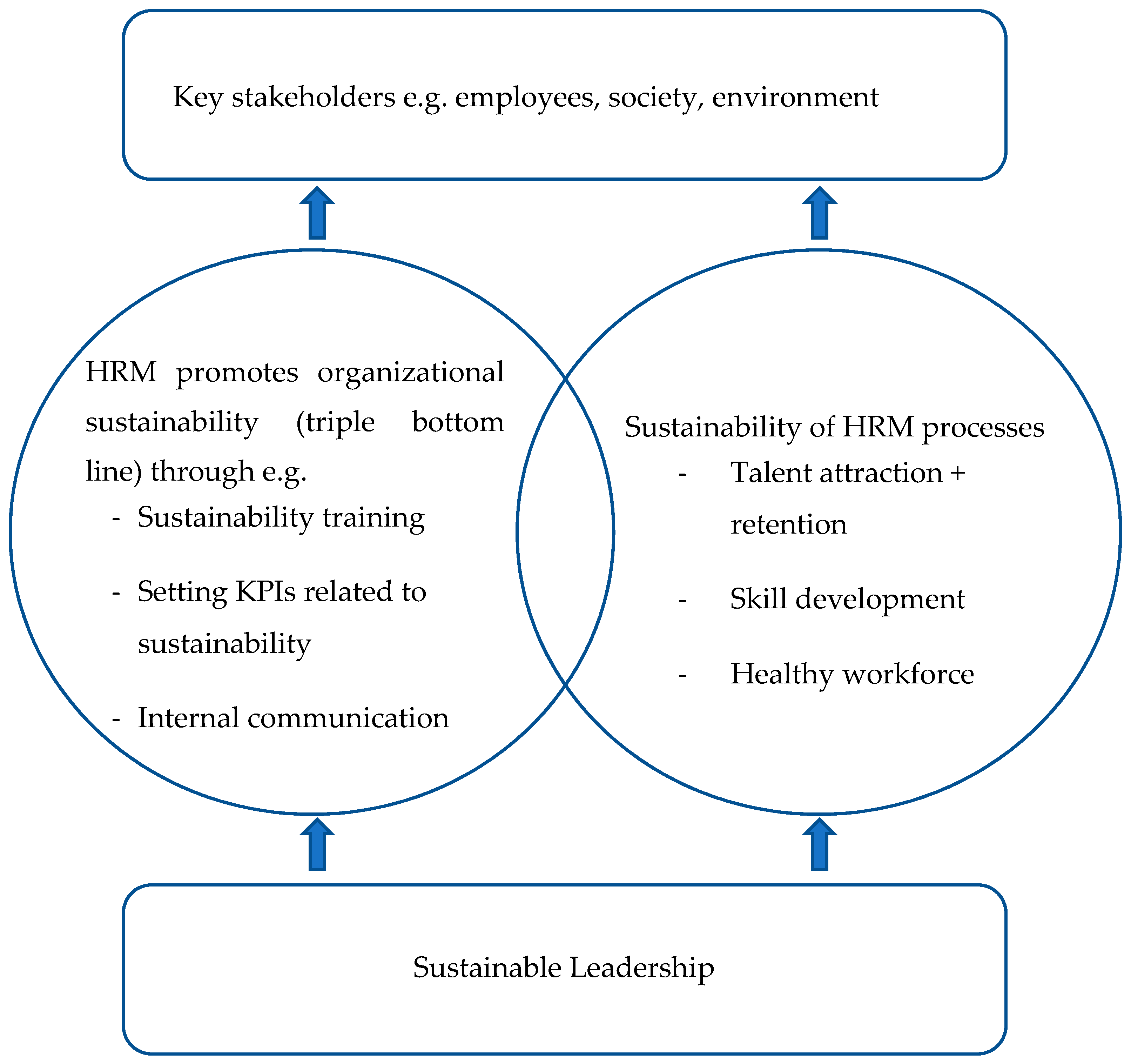
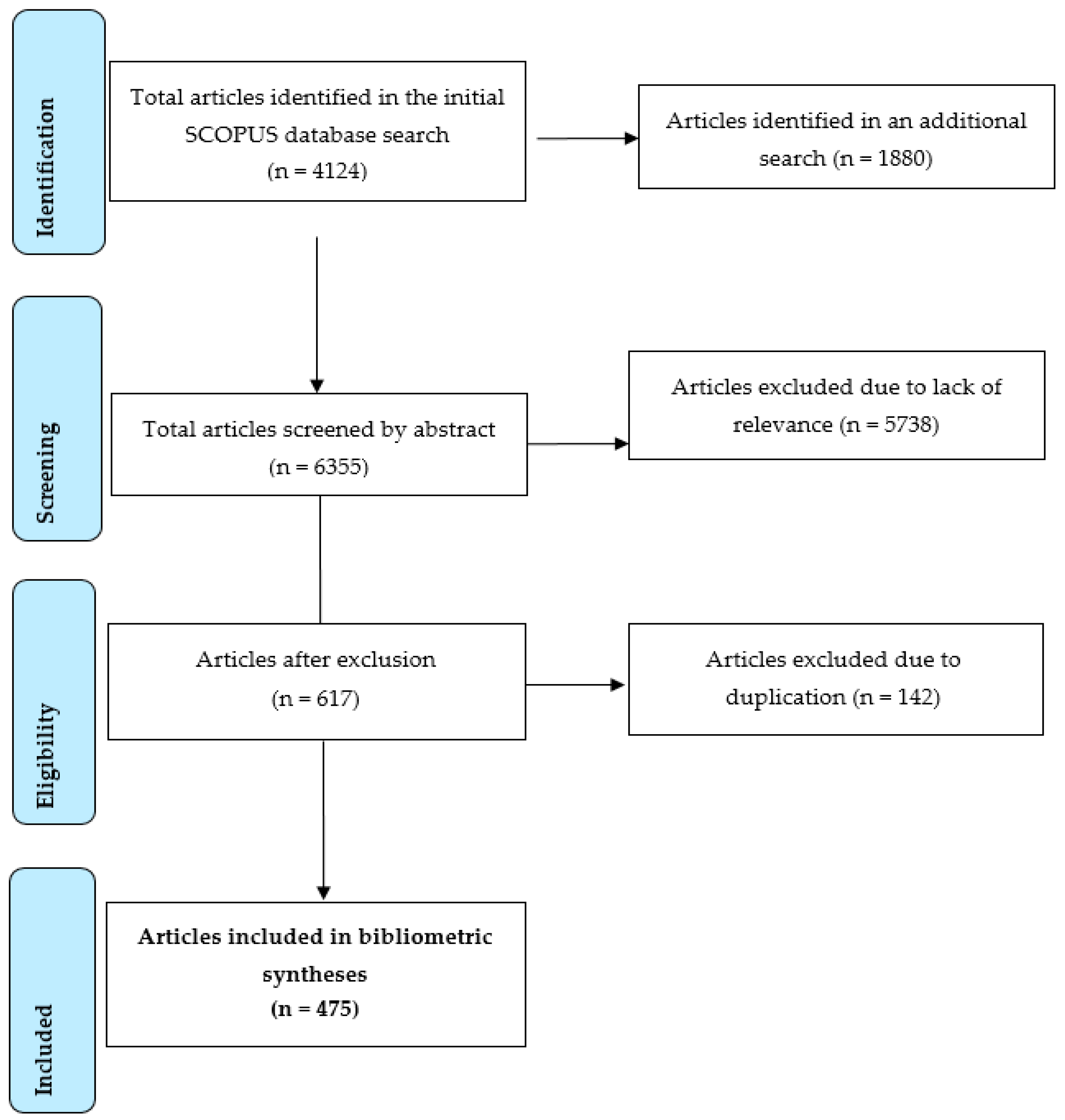
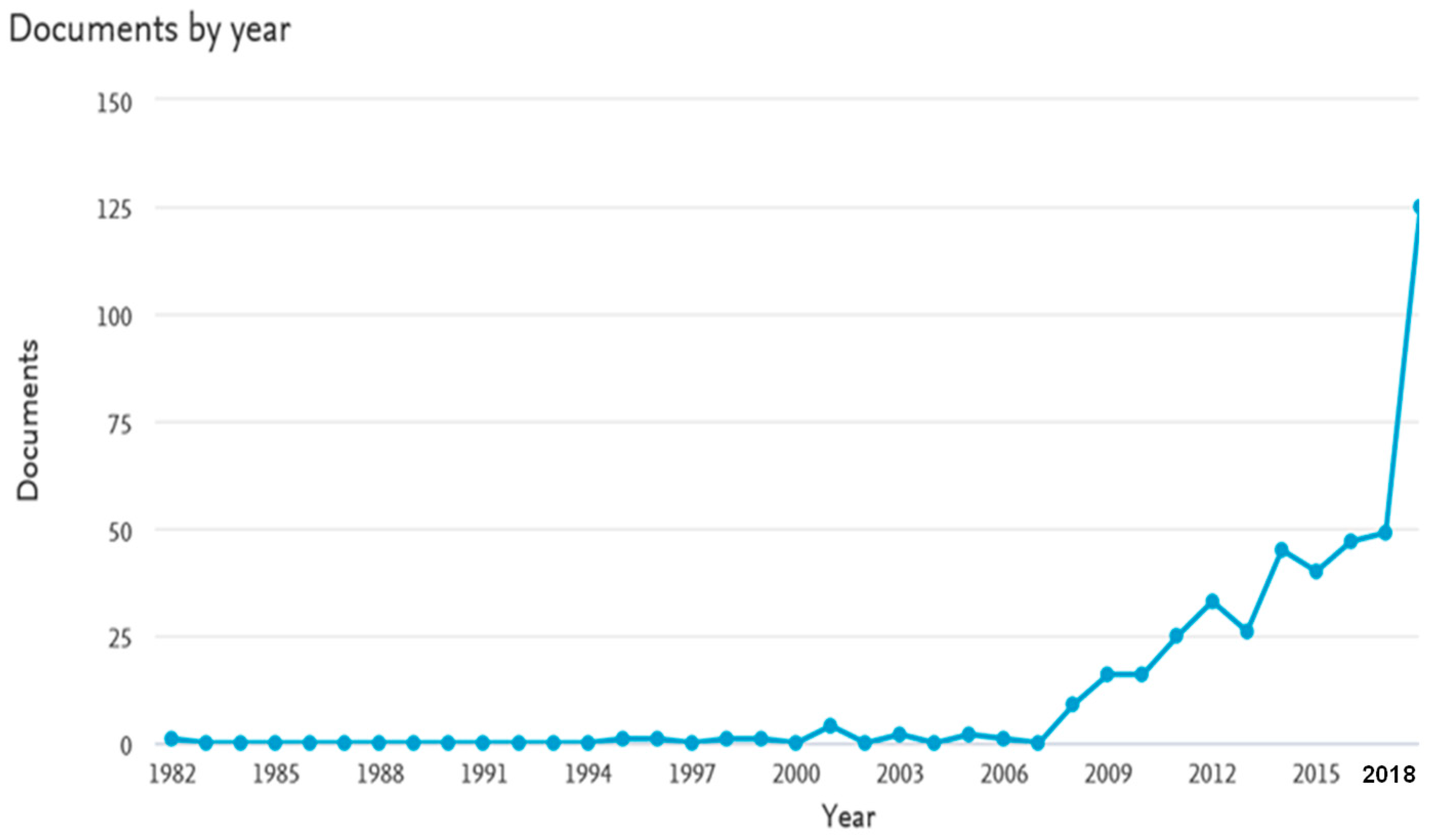
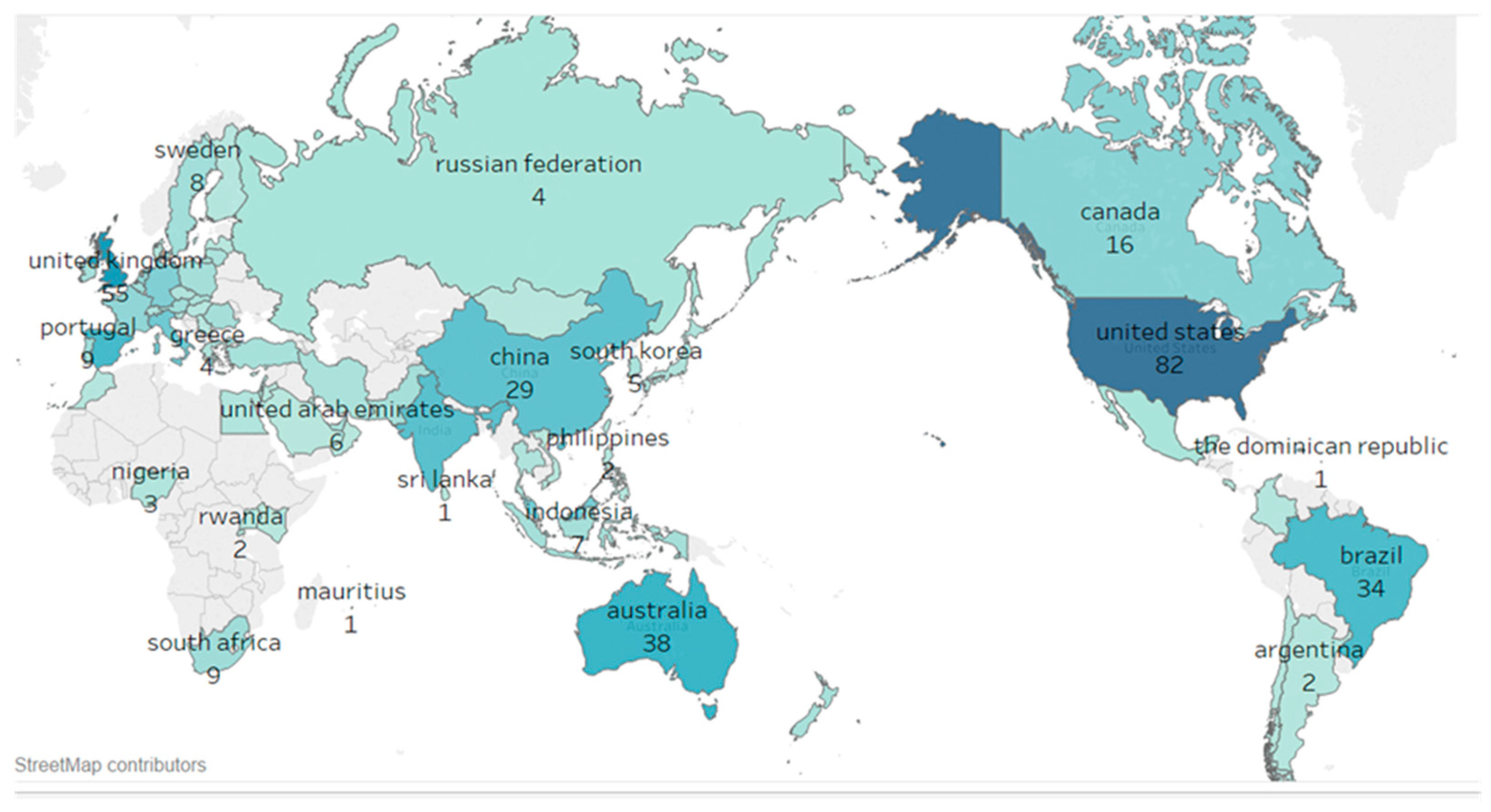
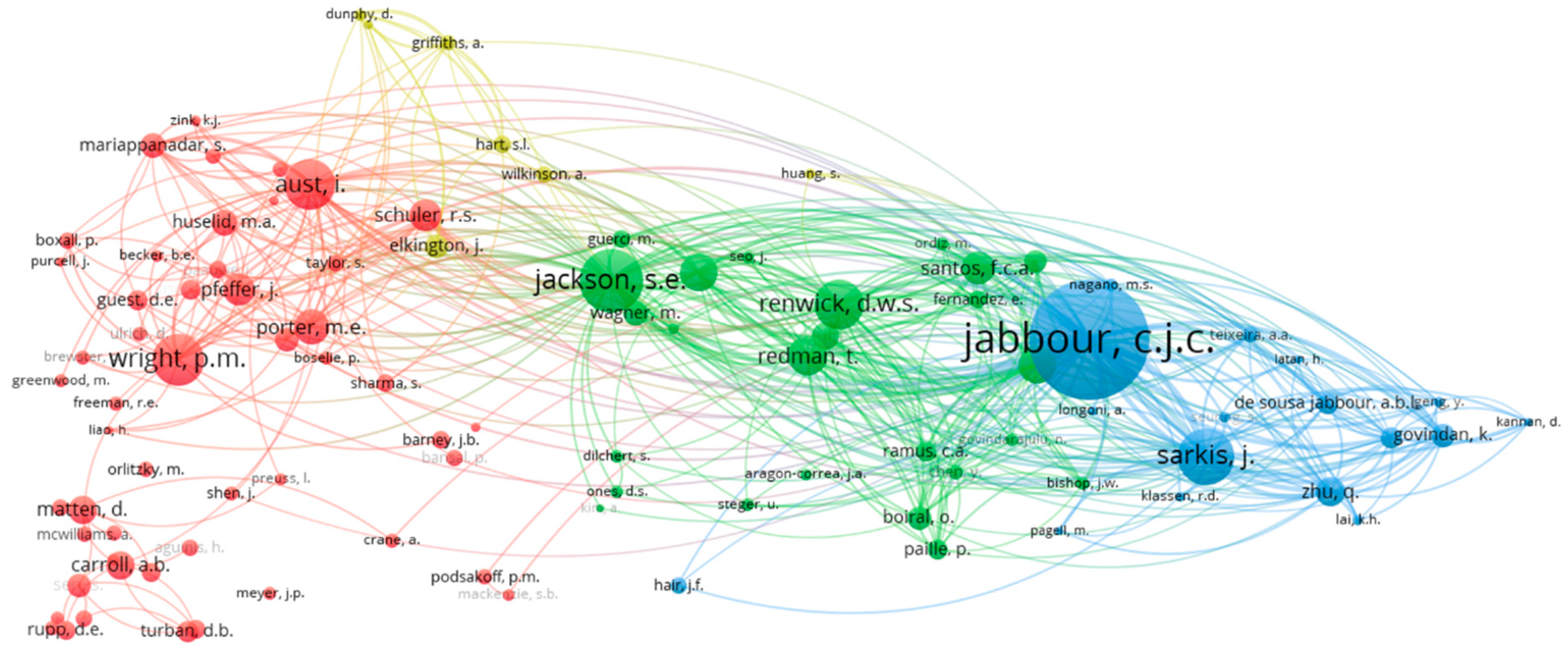
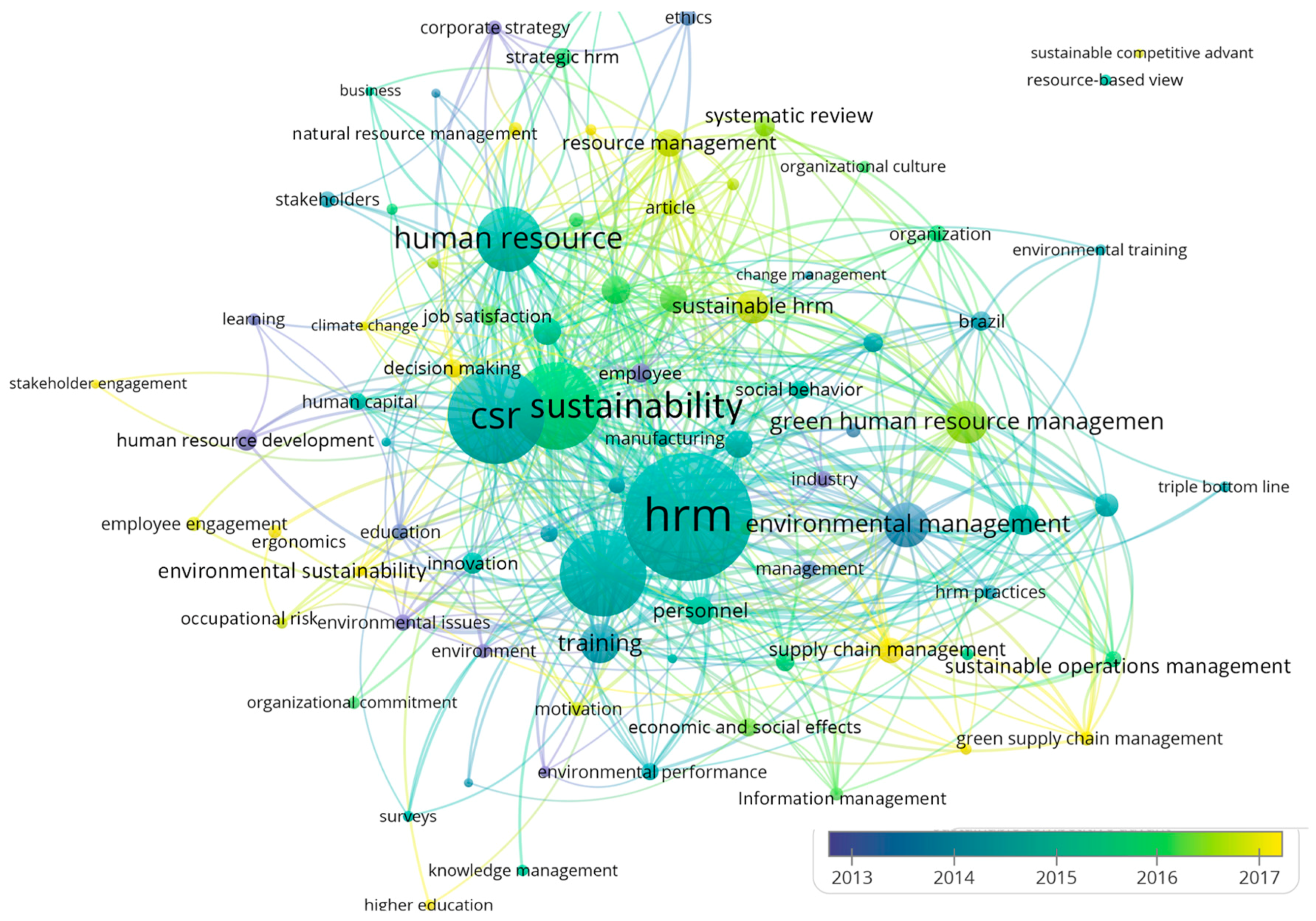
| Rank. | Source | Domain | Number of Documents | Scopus Citations | Scopus Quartile |
|---|---|---|---|---|---|
| 1 | Int’l Jnl of Human Resource Management | Bus and Mgt | 20 | 451 | Q1 |
| 2 | Journal of Cleaner Production | Env Sci | 32 | 377 | Q1 |
| 3 | Int’l Jnl of Operations and Production Man | Dec Sci | 2 | 347 | Q1 |
| 4 | Human Resource Management | Bus and Mgt | 7 | 288 | Q1 |
| 5 | Academy of Management Annals | Bus and Mgt | 1 | 189 | Q1 |
| 6 | Journal of Sustainable Tourism | Soc Sci | 5 | 176 | Q1 |
| 7 | Int’l Journal of Production Economics | Bus and Mgt | 3 | 159 | Q1 |
| 8 | Journal of Business Ethics | Arts and Hum | 10 | 144 | Q1 |
| 9 | Zeitschrift fur Personalforschung | Bus and Mgt | 2 | 141 | Q2 |
| 10 | Management Decision | Bus and Mgt | 2 | 133 | Q1 |
| 11 | Business Ethics | Bus and Mgt | 6 | 126 | Q1 |
| 12 | Advances in Developing Human Resources | Bus and Mgt | 6 | 117 | Q2 |
| 13 | Industrial and Commercial Training | Bus and Mgt | 7 | 88 | Q2 |
| 14 | Resources, Conservation and Recycling | Econ and Fin | 5 | 86 | Q1 |
| 15 | Int’l Journal of Training and Development | Soc Sci | 1 | 83 | Q2 |
| 16 | Personnel Psychology | Psych | 1 | 75 | Q1 |
| 17 | Organisation Management Journal | Bus and Mgt | 1 | 74 | Q3 |
| 18 | Organizational Change for Corporate Sust | N/A | 1 | 69 | N/A |
| 19 | Scandinavian Jnl of Hospitality and Tourism | Bus and Mgt | 1 | 68 | Q2 |
| 20 | Sustainability (Switzerland) | Soc Sci | 27 | 62 | Q2 |
| Rank | Author | Nation | Documents | Scopus Cites | CPD |
|---|---|---|---|---|---|
| 1 | Jabbour C.J.C. | France | 21 | 703 | 33.5 |
| 2 | Jackson S.E. | USA | 3 | 380 | 126.7 |
| 3 | Daily B.F. | USA | 2 | 343 | 171.5 |
| 4 | Huang S.-C. | USA | 1 | 341 | 341 |
| 5 | De Sousa Jabbour A. | France | 5 | 216 | 43.2 |
| 6 | Jiang K. | USA | 1 | 189 | 189 |
| 7 | Schuler R.S. | USA | 1 | 189 | 189 |
| 8 | Boudreau J.W. | USA | 1 | 175 | 175 |
| 9 | Ramstad P.M. | USA | 1 | 175 | 175 |
| 10 | Santos F.C.A. | Brazil | 4 | 152 | 38 |
| 11 | Muller-Camen M. | Austria | 2 | 140 | 70 |
| 12 | Renwick D.W.S. | UK | 5 | 140 | 28 |
| 13 | Teixeira A.A. | Brazil | 4 | 114 | 28.5 |
| 14 | Garavan T.N. | UK | 3 | 113 | 37.7 |
| 15 | Kramar R. | Australia | 2 | 107 | 53.5 |
| 16 | Latan H. | Indonesia | 2 | 93 | 46.5 |
| 17 | Bierema L. | USA | 1 | 83 | 83 |
| 18 | Fenwick T. | UK | 1 | 83 | 83 |
| 19 | Mcguire D. | UK | 1 | 81 | 81 |
| 20 | Gunasekaran A. | USA | 2 | 79 | 39.5 |
| Rank | Document | Society 1st Author | Area | HRM Focus | Type of Doc | Scopus Cites |
|---|---|---|---|---|---|---|
| 1 | Daily and Huang [70] | USA | Bus | HRM | Con | 341 |
| 2 | Jackson et al. [48] | USA | Bus | SHRM | Rev | 189 |
| 3 | Boudreau and Ramstad [31] | USA | Bus | Talent | Con | 175 |
| 4 | Lee [73] | Australia | Bus | Env Training | Emp | 130 |
| 5 | Bohdanowicz et al. [74] | UK/ | Bus | HRM | Emp | 119 |
| 6 | Jackson et al. [4] | USA | Bus | Green HRM | Rev | 117 |
| 7 | Jabbour and Santos [35] | France | Bus | HRM | Con | 100 |
| 8 | Kramar [5] | Australia | Bus | HRM | Rev | 94 |
| 9 | Fenwick and Bierema [75] | UK | Bus | HRD | Emp | 83 |
| 10 | Garavan and McGuire [76] | UK | Bus | HRD | Rev | 81 |
| 11 | Morgeson et al. [77] | USA | Bus | HRM | Rev | 75 |
| 12 | Jackson and Seo [1] | USA | Bus | Green HRM | Rev | 74 |
| 13 | Jabbour and De Sousa Jabbour [65] | France | Bus | Green HRM | Con | 73 |
| 14 | Benn et al. [78] | Australia | Bus | Change | Book | 69 |
| 15 | Bohdanowicz and Zientara [79] | UK | Bus | HRM | Emp | 68 |
| 16 | Jabbour [66] | France | Bus | Green HRM | Rev | 62 |
| 17 | Teixeira et al. [67] | Brazil | Bus | Env Training | Emp | 62 |
| 18 | Longoni [80] | Spain | Bus | HRM | Emp | 58 |
| 19 | Preuss et al. [81] | UK | Bus | HRM | Emp | 58 |
| 20 | Jabbour et al. [68] | France | Bus | Green HRM | Emp | 57 |
| Rank | Document | Society | Co-Citations |
|---|---|---|---|
| 1 | Renwick et al. [71] | UK | 31 |
| 2 | Barney [82] | USA | 30 |
| 3 | Daily and Huang [70] | USA | 23 |
| 4 | Jabbour and Santos [69] | France | 21 |
| 5 | Greening and Turban [83] | USA | 20 |
| 6 | Govindarajulu and Daily [72] | USA | 19 |
| 7 | Jackson and Seo [1] | USA | 19 |
| 8 | Pfeffer [32] | USA | 18 |
| 9 | Brammer et al. [84] | Australia | 17 |
| 10 | Jabbour and Santos [35] | France | 17 |
| 11 | Albinger and Freeman [85] | USA | 15 |
| 12 | Collier and Esteban [86] | UK | 14 |
| 13 | Ehnert and Harry [3] | Belgium | 14 |
| 14 | Huselid [87] | USA | 14 |
| 15 | Sarkis et al. [88] | USA/Spain | 14 |
| 16 | Carroll [89] | USA | 13 |
| 17 | Fenwick and Bierema [75] | UK | 13 |
| 18 | Paillé et al. [90] | Canada | 13 |
| 19 | Peterson [91] | USA | 13 |
| 20 | Aguilera et al. [92] | USA | 12 |
© 2019 by the authors. Licensee MDPI, Basel, Switzerland. This article is an open access article distributed under the terms and conditions of the Creative Commons Attribution (CC BY) license (http://creativecommons.org/licenses/by/4.0/).
Share and Cite
Kainzbauer, A.; Rungruang, P. Science Mapping the Knowledge Base on Sustainable Human Resource Management, 1982–2019. Sustainability 2019, 11, 3938. https://doi.org/10.3390/su11143938
Kainzbauer A, Rungruang P. Science Mapping the Knowledge Base on Sustainable Human Resource Management, 1982–2019. Sustainability. 2019; 11(14):3938. https://doi.org/10.3390/su11143938
Chicago/Turabian StyleKainzbauer, Astrid, and Parisa Rungruang. 2019. "Science Mapping the Knowledge Base on Sustainable Human Resource Management, 1982–2019" Sustainability 11, no. 14: 3938. https://doi.org/10.3390/su11143938
APA StyleKainzbauer, A., & Rungruang, P. (2019). Science Mapping the Knowledge Base on Sustainable Human Resource Management, 1982–2019. Sustainability, 11(14), 3938. https://doi.org/10.3390/su11143938




